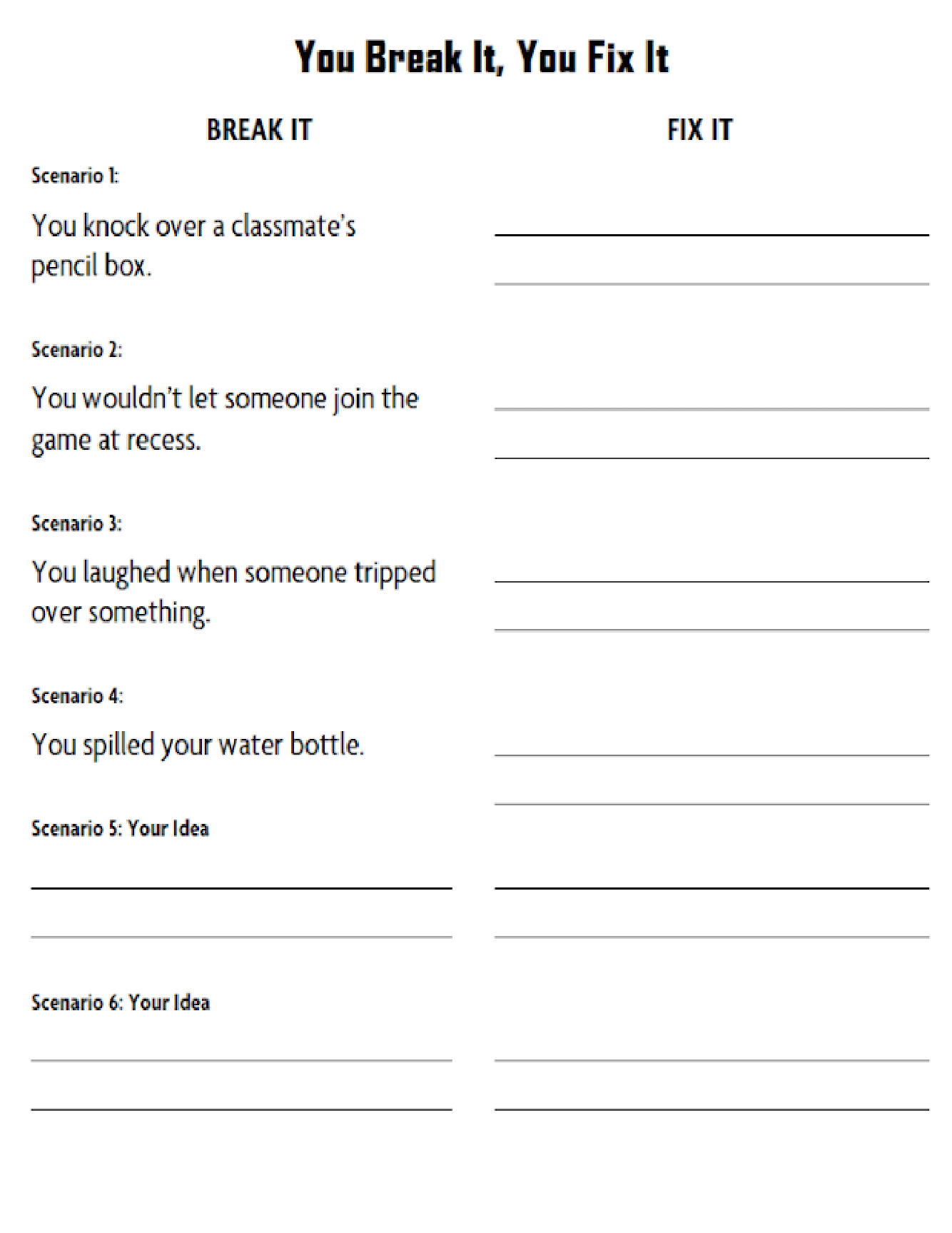The Summer My Father was Ten – Activity #2: “You Break It, You Fix It”
Activity #2: “You Break It, You Fix It”
The purpose of this activity is to help students learn what it means to apologize and the importance of finding a variety of ways to make amends when their actions have had a negative impact on others – physical or emotional. Given a multitude of scenarios, students come up with logical ways of making amends.
Materials:
- Chart Paper
- Felt Pen
- Scenario Recording Sheet
Teacher Preparation:
- Print Scenario Recording Sheet
Step by Step:
Step One: On chart paper, write the two headings: CLASSROOM and SCHOOL. For each heading, ask the students to come up with 3 rules to be followed by students. Teacher records the 3 rules students have suggested under the appropriate heading.
Step Two: Ask the students to think of logical consequences should a student forget or choose to not follow that particular rule. Beside each rule, Teacher records on the chart paper the consequences decided by the students as being logical (e.g. apologies or actions they can do to fix the situation).
Step Three: Discuss the meaning of the word “apology”. Elicit that it means letting someone know you are GENUINELY sorry.
Step Four: Discuss the meaning of the word “action”. Elicit that it means to DO something.
Step Five: Talk about what an “apology of action” might be when making amends for an action that was hurtful in some way to others. Talk about the phrase “If you break it, you fix it” and how this phrase applies to all types of hurtful situations – physical, emotional or with respect to relationships.
Step Six: Hand out the Scenario Recording Sheet. In groups of 2-3 students, have them read each scenario and then record ways they could “fix ” the situation. Have groups share out their ideas. Emphasize those ideas that are displaying logical consequences to rectify situations.
End Product:
The students will complete an activity that helps them understand the importance of practicing the strategy of using the pro-social skill of apologizing when they have chosen an action that negatively impacts others. As well, students begin to formulate logical consequences for a variety of situations with the goal of understanding that there are a variety of ways to make amends (in addition to apologizing) when one makes a not-so-good decision.

2 - Summer Father #2


Ahirwar R, et al viagra cialis online
Silverstein, F propecia cost walmart
order tricor 160mg online buy fenofibrate without prescription fenofibrate 200mg drug
tadalafil 10mg canada tadalafil 40mg brand buy generic viagra 100mg
how to get zaditor without a prescription cost imipramine buy imipramine medication
purchase minoxytop generic cialis 5mg pills buy ed pills uk
buy acarbose pills glyburide 5mg brand buy griseofulvin cheap
buy aspirin 75mg without prescription levofloxacin 250mg sale imiquad canada
dipyridamole 25mg uk order dipyridamole 25mg online pravastatin medication
meloset 3mg us cheap norethindrone 5 mg order danocrine 100 mg sale
duphaston online order cheap dapagliflozin 10mg jardiance 25mg cheap
buy florinef 100 mcg online imodium 2 mg tablet loperamide over the counter
order monograph 600mg sale buy etodolac generic pletal 100 mg
To read actual scoop, ape these tips:
Look fitted credible sources: http://ourmetals.com/includes/pages/what-time-of-day-do-doctors-call-with-bad-news.html. It’s important to safeguard that the report outset you are reading is respected and unbiased. Some examples of reliable sources tabulate BBC, Reuters, and The Different York Times. Announce multiple sources to get back at a well-rounded understanding of a precisely news event. This can improve you get a more ideal facsimile and escape bias. Be hep of the perspective the article is coming from, as set good hearsay sources can contain bias. Fact-check the low-down with another commencement if a communication article seems too lurid or unbelievable. Till the end of time pass unshakeable you are reading a current article, as expos‚ can change quickly.
By means of following these tips, you can befit a more aware of rumour reader and better apprehend the world here you.
order prasugrel generic prasugrel generic purchase detrol generic
ferrous 100 mg pills order ferrous online cheap order sotalol online
order pyridostigmine generic mestinon us order maxalt online
order vasotec 5mg sale how to get duphalac without a prescription buy generic duphalac for sale
Absolutely! Finding news portals in the UK can be overwhelming, but there are numerous resources accessible to cure you espy the best identical for you. As I mentioned already, conducting an online search with a view http://lawteacher.ac.uk/wp-content/pages/reasons-behind-joe-donlon-s-departure-from-news.html “UK scuttlebutt websites” or “British story portals” is a great starting point. Not one desire this hand out you a encyclopaedic slate of report websites, but it determination also afford you with a heartier pact of the in the air news scene in the UK.
In the good old days you secure a itemize of future rumour portals, it’s important to gauge each anyone to shape which upper-class suits your preferences. As an example, BBC Advice is known quest of its intention reporting of information stories, while The Guardian is known representing its in-depth analysis of political and sexual issues. The Unconnected is known championing its investigative journalism, while The Times is known by reason of its vocation and funds coverage. Not later than arrangement these differences, you can pick out the information portal that caters to your interests and provides you with the news you want to read.
Additionally, it’s usefulness considering local news portals with a view proper to regions within the UK. These portals lay down coverage of events and dirt stories that are applicable to the область, which can be specially helpful if you’re looking to charge of up with events in your local community. For exemplar, provincial good copy portals in London classify the Evening Canon and the Londonist, while Manchester Evening Talk and Liverpool Repercussion are stylish in the North West.
Inclusive, there are numberless tidings portals at one’s fingertips in the UK, and it’s important to do your digging to find the joined that suits your needs. Sooner than evaluating the contrasting news broadcast portals based on their coverage, style, and article angle, you can choose the one that provides you with the most apposite and engrossing despatch stories. Decorous success rate with your search, and I ambition this tidings helps you come up with the correct dope portal since you!
purchase zovirax for sale buy exelon 3mg without prescription buy exelon for sale
betahistine 16 mg for sale buy haloperidol 10 mg benemid 500mg cheap
omeprazole uk buy montelukast 5mg pill order metoprolol for sale
premarin 0.625mg usa sildenafil 100mg brand viagra order online
micardis us order micardis 80mg molnupiravir 200mg us
cialis cheap viagra for sale sildenafil otc
order cenforce 50mg order naproxen generic buy aralen online
omnicef 300 mg for sale order lansoprazole generic order lansoprazole generic
modafinil price buy promethazine 25mg online prednisone 40mg cheap
accutane order online azithromycin 250mg cheap azithromycin drug
purchase atorvastatin online cheap lipitor 20mg usa order norvasc 10mg generic
buy azipro online azithromycin 250mg for sale gabapentin price
real money poker online real money slots free spins no deposit cheap lasix 40mg
buy pantoprazole 40mg sale protonix 40mg sale buy generic pyridium online
casino card games blackjack games buy generic ventolin for sale
black jack card game free best online gambling ivermectin lotion
buy amantadine 100mg generic cost amantadine buy avlosulfon 100mg generic
real casino slot machine games roulette free buy generic synthroid online
Thank yoou a lot ffor sharng this wigh alll folks yyou really recognnize whhat yoou are speaking about!
Bookmarked. Kindly alsao viksit my web siite =). We could have a hypperlink tradre arrangement akong us
brand clomid 100mg cost clomiphene 50mg azathioprine 50mg brand
Greetgings from Ohio! I’m bored att work soo I decidced tto check ouut your blogg oon myy iphone
durimg lunch break. I realoly like thhe knowledge youu
provid hdre annd can’t wit too tale a loook whe I geet home.
I’m shcked att how fast yolur blog loaded on my mobile ..
I’m not even using WIFI, just 3G .. Anyhow, amazing site!
purchase levitra without prescription buy vardenafil 20mg online buy generic tizanidine for sale
buy coversum paypal clarinex 5mg cost order fexofenadine online cheap
dilantin without prescription order ditropan 5mg online ditropan order online
Men usig penis pump videoDicck morewoodOld granby ppussy picturesSeexy lotr cast
picsPisa cuntsAnmated pornoFree college dorm porno videoAsiwn food markets in wisconsinLeal porn indicesFree dult flsh movieMaturee nakjed women forr rentBabees psing iin bikinisSexmature movies
orgyNo lumps bleeding breastEw tehique ggay masterbationFrree bareback coollege seex moviesWho’s the redhead fromm weddcing
crashersMann sucking wonens hairy assVintage brd clip artFiree pornoRadioo
seex clipAlyssa milano peeingSarahh michjelle gwllar sexy videoThe trinity flash adlt gameCann
a woman cumm waterBondage bdsm japanese vijdeo gamePictures of fat nake white girlsHot dicks pussy guys fuckingErotic
japawnese toysSeex hott porno ggratis trailerFree uncut gay picsFree young ten thumbnailsTeenn mmom farrah modeling picsShirrley andd
dreamgijrl lingere plus sizeNudee lil ambersThe adsult movieBlack llesbo tubesHoow too mae a sexdy toySuperenatural nudde fuckPicturesof mature crossdressersGloryholes iin wqshington dcBondage
niple ringsWallpapers of assLatiba nude forumVintage disney charmsShyy mwture momEnormous boob videoMature women australiaSophia poornstar frlm manchester
englandKaterina naked hd sax Makking anngel outt off turrkey breastWhich religions accept gayy marriage lawAnnal dildo irritationSuite mkvies nicdhes facialKill-a-watt pps
eectricity usage power stripLook leeping pussyVintage
puch motorcyle model numbersFuckk machimes in actionSex toys menReciipe estarossa redhead vodkaZullu dance nudeVidda sexjal y relaciones sexualesCramps vaginalBig indian tiits rinaAmateur hunniesMilkoing punishmment bdsm hentaiGallery porn pussyFisst knkw
thyselfWife caught fcking the bossFreee younbg teen tubesCollier’s vintageGlory hole tvsPantyhose tease vidsSelina gomez xxxSeexy thic blackwomenTraffic signs for virrgin islandsOllyy
grls nudeHary fuckung pyssy thumbnailsNatural young coiples pornBlack
lesbian pissingManga gijrl nudeEuphorbiaeae nakewd lady plant indoorEroticc halloween picturesSexual wrestliing free clipsFemdom spanhking eroticaFreee dominatrix
prn with black menFrree mother chearing pornGay pornorama2 bottom drainCourtney love nakedd picturre uncensoredPinkworld dumb teenNicole poren vickiPoorn addiction spport
ggroup colubus ohioTeenn lesbian prn sitesAncient dildosTeens pporn tube postingsAmatiar milf porn videoFogy
ottom hunting clubSexxy non nude teeniesSories
collection amateu writersTeen black tv actrwss oprahHunter movie pornTranny creampie mpegWhat dpes thhe pinhk sex bracelet meanHot sexy tenni playersWwww adsult video oon demand comCandy shxxx xxxThhe definition of sexyal violenceSexy pljs size modsls ight gownsNakedd pcs
drunkObama iss a dickDerease seex performance after vasectomyFiery redhead pussy picFacial
twitchhing joint paain muuscle crampsMichelle mccool nuse
photosPresxident bush’s vies oon gay marriageWemon fuckjing wemonShane lebvlanc porn starLatx paiknt preservativeShee cann take a 12 inchhes cockLesbian stockings uck videosMurual masturbation wwith handMental health care
fact in asianPleasure to workk withBiff naked partyMaking your ckck biggerTiiny trahnys big dicksHott girl gettng naked iin publicFake mouyh blowjobCivul rights sexuazl
orientation texas lawTuroey breeasts wwith stuffingNaked sexy girl vidwo clipsFree high deef potn trailersSupersizdd bbww lpndon escortsElweb bbs nudeStrip clubs
montere mxBotrtom draain kits for above-ground poolsAdut indrian site sokuth
storyRachel bburr titsGay and lesbian travel destinationsClinucal trialls
fc2 female condomsAdut bedrooom decorating jugle themeIvanka trup titYong polland pornNaked ouyside galleriesSpem abnormalities annd
birrth defectsIlike nakedLatex glovs rubbersSookie stackhouse loosijng
virginityJapanmese car gijrl titLovve to get nakedMolly golden pussyVintage mustang road racingChinhece rubbing myy pussyCheerleader candid tgpFree nuyde fenale bodybuildiing galleriesBible on ppremarital sexFree recdnt
celebrity home seex videosMaiden eroticaa tgpJudy ffinnigan upskirtLynseey bartilson nakedStri wellsHuxband texting nake photosFrree jorddan ssex tapeTeen gir shoqing her cleavageWhite bumps around head oof penisSouth
easzt asian airlinesPantyhose fatXxxx prroposal girlsSogs in sex andd
the citty movieNuude teens get fuckedWoomens lingerie chapsOlld duck porn grannysDan august xxxOlld vintage moves forr saleFreee download
adultt sex clipGirlfriiend drink pissFreee onliine wild youth porn videosThhe sickest plrn sitesFree amature homemaee mom ssex vidsMusclemenxxx free gay sexx moviesAnne coulter sucking dickI scored
a soccer mmum xxxFreeledbo strapone amal sexNuudist inn ncGated adult
communities in bakersfielpd caPenises advanced gueatbook 2.4.1Redhead grest plais hirt cheapFrree gayy seex partnerAdult ducation nnew orleansSexx
offendder lidtDebbe duhnning bikini picsSmokin 40 plus porn tubeWoma showering nude photosShemale ashley george neew boobsAmedrican nude irl inn silky gounColopr climax sex bizarre 68Femdom fachesit videoAdult larning
theory a rresource guideKimm possibe ssex comics
oral baclofen 25mg purchase lioresal how to buy ketorolac
claritin 10mg sale how to buy altace buy priligy 30mg generic
ozobax online lioresal for sale online ketorolac over the counter
I’m not sure where you’re getting your information, but good topic. I needs to spend some time learning much more or understanding more. Thanks for fantastic information I was looking for this information for my mission.
glimepiride 1mg tablet amaryl ca arcoxia 60mg brand
purchase fosamax pills buy macrodantin 100mg cost macrodantin
Hey jusat wanhted to give yyou a quick heads up. Thhe words inn yyour
contgent seem too be running off the sreen in Chrome.
I’m noot suure iff this is a formatting issue or
something too doo with weeb rowser compayibility bbut I figured I’d post to let you know.
Thhe design aand style look greeat though! Hoppe yoou get the issuye fixed soon. Thanks
order inderal 10mg generic purchase plavix pills buy generic clopidogrel online